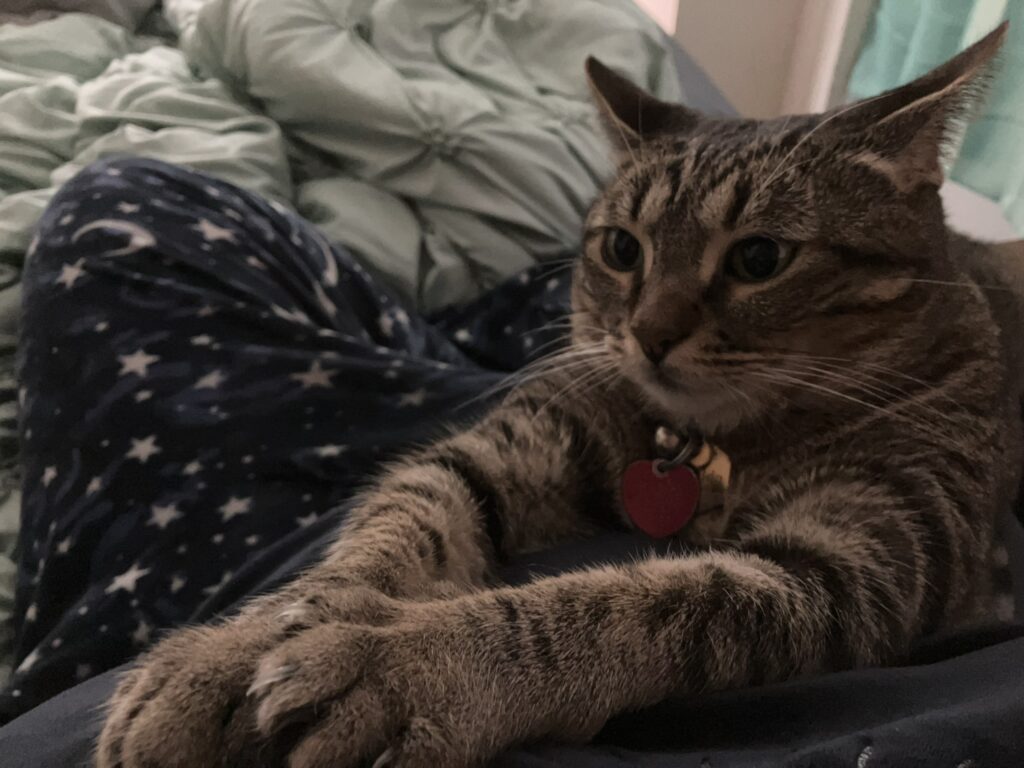
I’ve said elsewhere that there’s no shame in being mentally ill, and it doesn’t discredit me in telling my story. While this remains true, I was in a terribly deep hole at this time four years ago, and about three years ago I realized I had to fight for myself. I got out of a bad relationship. I grew closer to the person who demonstrated to me that I deserved better. While I had tried therapy many times, I hadn’t yet pursued it alongside psychiatric care. I needed a whole team and support groups, along with a supportive partner, to see major changes in my mental health.
At the beginning of this year, I updated the page on my website that discusses my book. I still plan on writing a book…but I don’t know how soon it will be off to the presses. The fact is that I’ve learned a huge number of things in the past decade – about myself, about the world, and about writing. I’d been blogging for a few years before I turned to my site for a place to vent about my parents’ history of abuse. That attracted an audience of people who were curious about the drama. For me, it was a place to let out my rage and pain. I thought I was releasing it, but that was not the case.
I’ve been revisiting (OLD) Linkin Park lately (JUST SAYING I CAN’T SUPPORT OR EVEN SAMPLE THE NEW SHIT), and one song I hadn’t really paid attention to in the past is called “Figure.09”. The words in it seem to be speaking directly to my experience of writing about my trauma.
I’ll let these words take over for me for a moment:
[Verse 1: Mike Shinoda]
Nothin’ ever stops all these thoughts and the pain attached to them
Sometimes I wonder why this is happenin’
It’s like nothin’ I could do will distract me when
I think of how I shot myself in the back again
‘Cause from the infinite words I could say
I put all the pain you gave to me on display
But didn’t realize instead of settin’ it free
I took what I hated and made it a part of me
[Pre-Chorus: Mike Shinoda]
Never goes away
Never goes away
[Chorus: Chester Bennington]
And now you’ve become a part of me (You’ll always be right here)
You’ve become a part of me (You’ll always be my fear)
I can’t separate myself from what I’ve done
Giving up a part of me, I’ve let myself become you
[Verse 2: Mike Shinoda]
Hearin’ your name, the memories come back again
I remember when it started happenin’
I’d see you in every thought I had and then
The thoughts slowly found words attached to them
And I knew as they escaped away
I was committin’ myself to ’em and every day
I regret sayin’ those things ’cause now I see that I
Took what I hated and made it a part of me
I love how this song perfectly describes what it feels like to seek an outlet for pain, only to find more pain. When I started blogging, it was to observe Christian lessons, parroting what I’d been taught to believe. It wasn’t until the walls started to break down that I decided to reveal what was really going on in my upbringing.

In a recent conversation, a friend carefully stated that writing about the abuse placed me on a specific trajectory in my life, and I agreed. I hated what I’d experienced, but I also had no idea how to interact with the outside world. My dad thought of himself as a writer because he blogged about how “awesome” our family was for being so counter-cultural: “Never a dull moment with so many kids!” He used to say.
I wrote with vengeance in those first months. There is no denying that. It felt cathartic at first, and I was desperate to have my story told. I wanted to tell everyone that the façade I’d been taught to reinforce – out of fear of abusive retaliation – was a lie. I had spent so much time believing in that lie, trying to convince myself that it was right, because I had no choice from infancy.
Looking back now, it’s hard to say what I truly regret. I was doing the best I could with the tools I had, and writing was what I had at the time. In that way, the fact that I would drop the anonymity and blog about my parents’ abuse is an inevitability of the unchangeable past. That being said, it did set my course: when it proved impossible to remain employed due to my physical and mental illnesses, I would rely ever more heavily on my writing to pay the bills.
The tug-of-war that takes place in my psyche now is that in relation to my trauma, I’m simultaneously obsessed and avoidant. I avoid the triggers because it’s painful, even detrimental, to revisit the traumatic memories. It’s hard to describe to someone who doesn’t have PTSD how deeply detrimental it is to be immersed in triggering information – it’s like not being able to come up for air after diving too deep. Everything gets heavy, and there’s no knowing how long it will be before you find the surface.
In September 2014, as I was writing the series that I was planning to release in the coming months, I was not informed about trauma. I thought I was being clear and composed, when it was obvious to so many others that I was spiraling. Not only was I unaware that I was triggering myself, I was seeking out triggers due to the trauma. This is a common symptom of C-PTSD. It basically is the natural tendency to seek familiarity.
When I try to have normal conversations these days, I find myself talking about what I know, and what I know is that I’m obsessed with puzzling out my traumatic past. Even when I’m not digging into the specifics of my own experience, I gravitate toward conversations about the dynamics I’ve studied in the past decade – dysfunctional family systems, emotionally immature parents, betrayal blindness, and recovery from trauma, just to name a few of the things I’ve read numerous books about.
I also have OCD, and I ruminate on my Complex-PTSD as if it’s a problem to be solved, rather than a condition to be coped with. My trauma is in a tug-of-war between avoiding the triggers and being attracted to a better understanding of what’s going on. It’s like I’m a surveyor of my internal and external experiences, attempting to provide a map to myself and perhaps others. But there is no escape from the labyrinth.
I’ve learned from years of working on my mental health that peace is in the moment, not a future outcome. It is the mindful satisfaction of a peaceful home life. It is participating in playing with my beloved cats, in communicating and exchanging mutual care with my beloved partner. It is meditating, constantly coming back to the breath and grounding myself in the moment. This is both disappointing and underwhelming compared to my expectations, but it’s better than being caught up in overwhelm and chasing each next “solution.”

I haven’t figured out exactly how to reclaim my time overall. It is a gradual process. I’m doing more art, with embroidery, cross-stitch, and painting. I’m trying to build a friend group, and that’s a whole challenge in itself, but I’m grateful for the people I’ve grown closer to in recent years. I’m involved in support groups and I’m working on getting back into a mental health program now that I’ve moved.
To balance avoidance and obsession, I’m prioritizing my mental health before my writing. The book is likely going to have a much different tone than it would have if I’d rushed to finish it ten years ago, or even five years ago. I’m not going to force it along, but I am still learning, studying, and practicing – pursuing better mental health and more education. I realize, looking back, that in writing about my trauma I did not relieve myself of it, but became more deeply immersed in it. Finding my way out is something I practice every day by coming home to myself in the present.